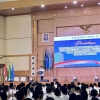Research in educational management holds a crucial position because it provides the scientific basis for the development of more targeted policies and innovations. Research is understood as a systematic, logical, and empirical scientific activity aimed at finding solutions to real-world problems in education. Unlike conventional observation, which merely describes phenomena, research provides a more in-depth, theory-based analysis and generates new, testable knowledge. Therefore, research serves as a bridge between educational theory and practice, ensuring that resulting policies are not merely based on intuition but on valid and measurable data.
The function of research in educational management encompasses several key aspects. First, a theoretical function that enriches the body of knowledge by updating theories and concepts to meet the needs of the times. Second, a practical function that helps solve real-world problems in educational institutions, for example, by improving the quality of learning or school management strategies. Third, a policy function that provides an evidence-based policy foundation, enabling every managerial decision to be more objective and accountable. Fourth, an academic function, where research is a prerequisite for writing undergraduate theses, dissertations, and dissertations, serving as a form of scientific training for students. With these four functions, research serves as a crucial bridge connecting theoretical, practical, policy, and academic needs.
Furthermore, research offers several advantages that other forms of study lack. Its strength lies in its data-driven objectivity, its ability to reduce bias in decision-making, and its ability to provide scientific evidence that can be retested through replication. These characteristics enable research to provide both scientific legitimacy and practical implications for educational policy. Research findings extend beyond academic reports to inform innovation, such as designing new curricula, more effective learning methods, or developing educational institution management strategies tailored to student needs.
However, it's important to understand that there are a number of other studies that resemble research, such as program evaluations, literature reviews, non-research case studies, and scholarly opinion pieces. These studies are still useful in broadening insights and supporting initial analysis, but they don't generate new knowledge like research. Evaluations tend to assess program success, literature reviews strengthen theory, while case studies and opinion pieces are more descriptive and reflective. Therefore, while these studies have practical value, research remains a key pillar of scientific development and the basis for adaptive and high-quality education policies.
The entire text in this article is summarized from the Teaching Module Part 1 of the Management Research Methods Course by Prof. Dr. H.A. Rusdiana, M.M.
Follow Instagram @kompasianacom juga Tiktok @kompasiana biar nggak ketinggalan event seru komunitas dan tips dapat cuan dari Kompasiana. Baca juga cerita inspiratif langsung dari smartphone kamu dengan bergabung di WhatsApp Channel Kompasiana di SINI







